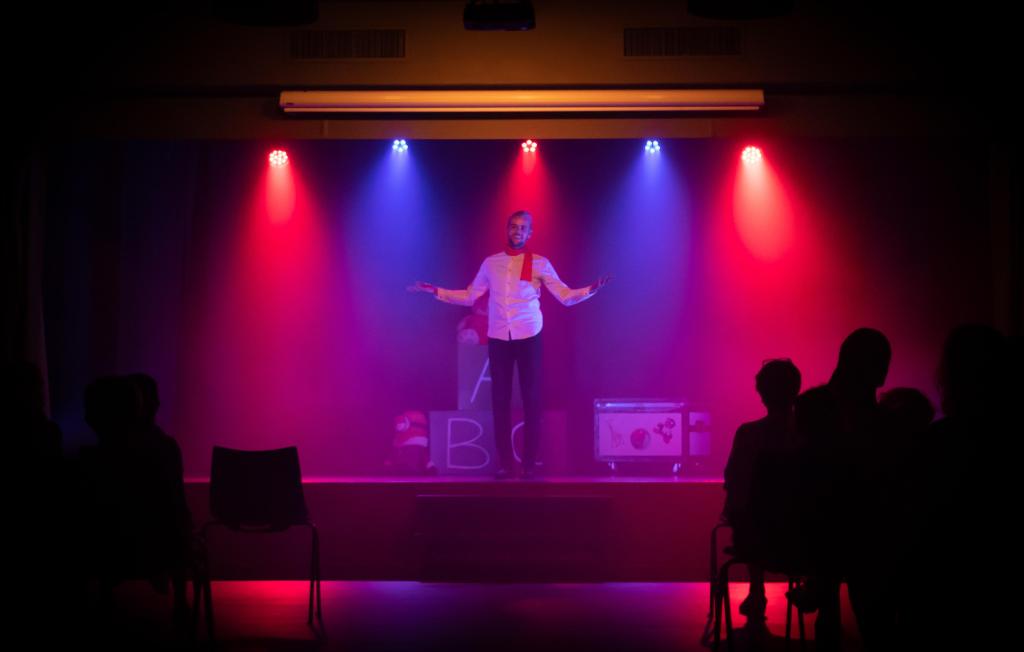Stand up comedy seems easy, but it’s not. First, there’s the arduous task of actually creating material–being able to look at life through a certain lens, then having enough skill to translate that perspective into jokes that actually land. Plus there’s the whole bearing-your-soul-to-a-room-full-of-strangers aspect, one of the most common fears known to man.

These factors combined perhaps don’t seem like a recipe for helping mental health, but as it turns out, stand-up comedy is proving to be a powerfully effective therapy tool. Just ask Angie Belcher, founder of Comedy on Referral.
Belcher has taught comedy for a decade, and over the years students would comment how much “stronger, more resilient and happier they were after exploring their personal histories through stand-up comedy.” It not only helped change their perspective, but sharing it all on stage put them in a “powerful position” to change their narrative of painful memories…possibly inspiring others to do the same.
“As a comedian, you could be the reason why someone in your audience does something differently,” Belcher told The Guardian
Comedy of Referral is a six-week program that allows people to process traumatic experiences by turning them into five minute comedy sets. Similar to the way art therapy helps explore difficult emotions through different mediums, students navigate personal issues through the use of theater games, as well as group and one-on-one work as they channel their “comedic persona.” Participants are supported by psychologists in order to avoid triggering any past trauma.

Watching comedy has long been researched and documented as a constructive way to cope with tragedy. Laughter itself produces endorphins that help release stress. It inspires empathy and connection. It can even help reduce stigmas surrounding certain mental health conditions. The Comedy on Referral program is proving that creating comedy can be just as helpful as consuming it. Their website claims that through stand-up coaching, trauma can become “more manageable as the story becomes one of validation and redemption rather than an unpleasant experience.”
The theory appears to be spot on. After a highly successful trial NHS-course for trauma survivors in Bristol, England, London’s NHS (National Health Service) has agreed to fund Comedy on Referral so that private practices throughout the country can prescribe the course to men at risk of suicide. Lourdes Colclough, head of suicide prevention at Rethink Mental Illness, noted that this demographic is an especially “hard-to-reach group.”
“Even though they’ve been diagnosed, [they] don’t think they have an issue and so won’t go to counseling or attend anything signposted [as] ‘suicide prevention’,” she reflected. But this is exactly the kind of challenge that Comedy on Referral is designed for. The unique curriculum uses creativity and humor to help people not only feel comfortable enough to open up, but come out being able to experience their life in a more empowering way.
Humor can be the friend we need when life gets hard. In times of uncertainty, crisis, and despair, it can uplift us from the inside out, and remind us that joy is a basic human need.
“I hope that participants will use what they learn on the course in their practical everyday life, so that they go into future endeavors with joy, hopefulness and playfulness rather than taking out their bully teenager-persona or their depressed 20-something persona or their grieving mother-persona or whatever it is,” said Belcher.
Comedy of Referral has plans to support as many people as possible. In addition, Belcher is also in talks to extend the program to young people with autism and ADHD, the Guardian reported.
Through programs like Comedy on Referral, people can learn to harness humor for themselves, and in the process become resilient, hopeful, and of course, funnier. Not a bad trade-off.


































